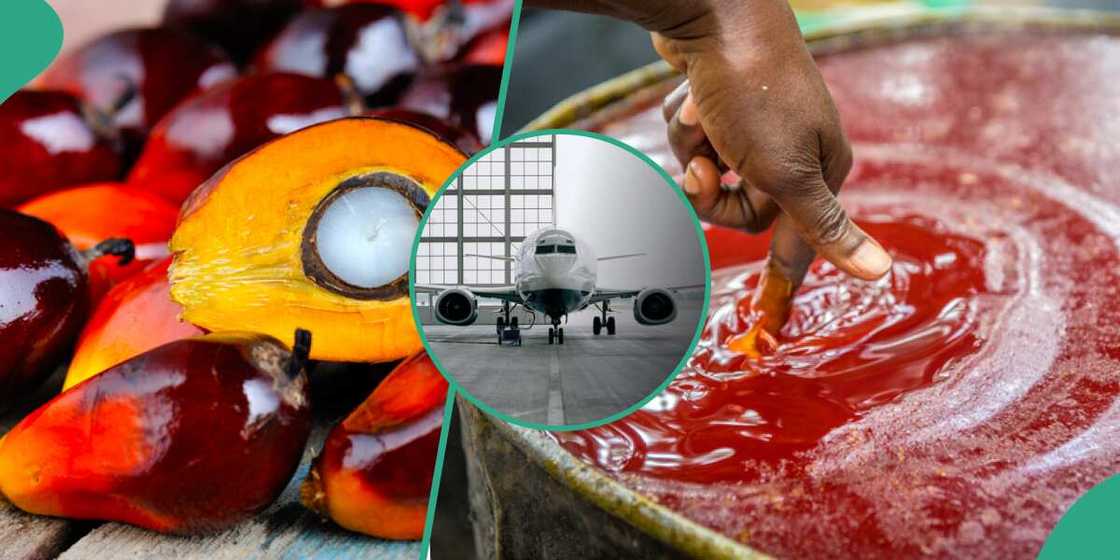Palm Oil Imports Drop 26% as Nigerian Production Surges, Dealers Sell at Reduced Rates
- According to recent data from the National Bureau of Statistics, Nigeria’s palm oil imports slumped in Q1 2025
- This was due to improved production by local players, who ramped output by 26% in the review period
- Local dealers have also reported a slump in retail prices and improved access to the commodity recently
Legit.ng’s Pascal Oparada has reported on tech, energy, stocks, investment and the economy for over a decade.
New data from the National Bureau of Statistics (NBS) reveals that Nigeria’s crude palm oil (CPO) imports slid by 26.2% in 2024, dropping from ₦17.03 billion in 2023 to ₦12.6 billion last year.
This decline occurred in spite of worsening foreign exchange scarcity and currency depreciation.

Source: Getty Images
Private sector spurs production growth
Analysts attribute the drop to increased investment by plantation firms, including PZ Wilmar, Nosak, Presco, Agri Palm, and Okomu, boosting domestic supply through large-scale cultivation and vertical integration.
Industry experts report Nigeria’s palm oil production now exceeds 1.4 million metric tons annually, with some estimates pushing toward 2.5 million metric tons.

Read also
Landing cost soars: Petrol prices to surpass N1,000 as Dangote Refinery and crude oil costs spike
According to a BusinessDay report, major private players are investing in backwards integration, controlling everything from seedling to refining, to reduce import dependence and improve margins.
Presco and Okomu, for example, are expanding plantation hectares and refining capacity while raising nearly ₦250 billion in equity for growth projects.
FX pressures fuel domestic focus
Stakeholders say the foreign exchange crunch is compelling local producers to scale up output quickly.
Imported palm oil is becoming more expensive and less viable given dollar scarcity and a weaker naira, pushing manufacturers toward locally sourced CPO.
Legacy loss, but new momentum
Reports by Market Forces Africa show that Nigeria once led the world in palm oil production in the 1960s and 70s, accounting for roughly 40% of global output.
Today, it ranks fifth globally, producing just 1.4–1.5 million metric tons, a drop to below 2% of world supply.
The gap has created a sustained $600 million annual import bill, signalling potential gains for local operators if this trend continues.
A previous report by Legit.ng disclosed that BUA Chairman, Abdul Samad Rabiu, unveiled plans to build a new palm oil refinery, which experts say will drive local refining to a new level.
Local champions reap big gains
Companies like Okomu and Presco are strengthening Nigeria’s palm oil revival. With vertical integration and export potential, they reported rising margins and revenues in 2024.
Their strategies include investment in new mills, replanting programs, and partnerships with state-led initiatives like the Edo State Oil Palm Programme, positioning them to capitalise on both domestic and regional demand growth.
Government policy supports transformation
The Nigerian government has launched frameworks like the National Palm Oil Traceability Framework and inter-agency coordination to improve quality, standardisation, and export readiness.
Additionally, incentives such as land grants, fiscal support, and FX restrictions on importers are boosting local production incentives.
A local palm oil dealer in the Ifo area of Lagos, John Ike, told Legit.ng in an exclusive chat that the price of the commodity has reduced drastically due to improved availability.
“Right, now dealers and micro retailers can easily access the product because bulk buyers now get it faster and cheaper from producers,” he said.
He expressed shock that the commodity can be imported when Nigeria is the top producer.
“This is the first time I am hearing that Nigeria also imports palm oil. I thought it was a commonplace product because growing up in my village, every family had palm trees scattered in their compound. It was a sign of wealth,” he disclosed, reflecting the widespread belief among locals that Nigeria should be self-sufficient in palm oil.
What lies ahead: Growth or grind?
With increasing domestic demand from food producers and the growing use of palm oil in sectors like biodiesel and aviation fuel, the opportunity for expansion is significant.
Yet challenges remain: ageing plantations, supply chain cracks, and smallholder exclusion threaten long-term growth.
Experts emphasise the need for scaled replanting, infrastructure upgrades, and capacity-building for smallholders to sustain momentum. Without these reforms, import dependence may persist, keeping a lid on export potential and revenue gains.

Read also
Big Win for Nigeria! Crude Production Surges to 1.8 Million Barrels — What this means for naira
Nigeria’s palm oil narrative is changing. With import bills shrinking and domestic production rising, the country is reversing decades of reliance on foreign suppliers, thanks to targeted investment, policy reforms, and renewed commitment to agricultural transformation.
Nigeria’s reliance on palm oil imports is shrinking fast.
Despite forex shortages and a weaker naira, domestic crude palm oil now fetches more of consumer and industrial demand.

Source: Getty Images
The shift reflects growing investment from companies like PZ Wilmar, Presco, Okomu, and JB Farms, which are expanding plantations and backwards integration.
Palm oil price set to rise in Nigeria
Legit.ng earlier reported that Indonesia, the world’s top palm oil producer, has raised its export tax on crude palm oil (CPO) from 7.5% to 10%, effective May 17, 2025.
The policy, the Indonesian government said, aimed at bolstering its domestic biofuel program and supporting smallholder replanting schemes.
The Indonesian Ministry of Finance said additional taxes on a range of palm oil products would help finance replanting activities and fund the production of both biodiesel and palm oil, a key commodity that contributes 4.5% to the country’s GDP and employs about 3 million people.
Source: Legit.ng




